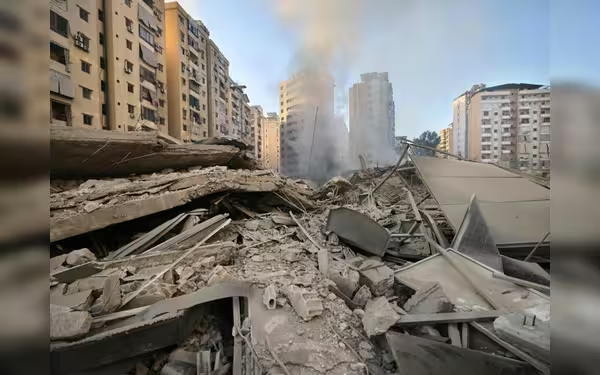Saturday, November 16, 2024 05:57 PM
Lebanon Emergency Services Face Crisis After Devastating Airstrikes
- Emergency services overwhelmed by airstrikes in Lebanon.
- Over 100 individuals buried under rubble in Sidon.
- Urgent need for humanitarian aid and supplies.
 Image Credits: arabnewspk
Image Credits: arabnewspkLebanon's emergency services are overwhelmed following airstrikes, with urgent needs for aid and supplies as the humanitarian crisis deepens.
In recent days, the situation in Lebanon has escalated dramatically, particularly following a series of devastating airstrikes by Israel. The emergency services in the country, already strained by years of economic hardship and political instability, are now facing an overwhelming crisis. The bombing of buildings near the southern city of Sidon resulted in the collapse of numerous apartments, tragically burying over 100 individuals beneath the rubble. This catastrophe has left emergency responders like Mohamed Arkadan grappling with a level of destruction they have never encountered before.
Arkadan, a seasoned member of the civil defense forces, expressed his shock at the scale of the disaster. Within just 24 hours of the bombing, his team managed to recover more than 40 bodies, including those of children, and rescue 60 survivors. The emotional toll of such events is immense, especially when responders are forced to confront the harsh reality of their limited resources. "We have zero capabilities, zero logistics," Arkadan lamented, highlighting the dire need for basic supplies such as gloves and personal protection gear.
The ongoing economic crisis in Lebanon, which began in 2019, has severely hampered the country’s ability to provide essential services. The aftermath of the catastrophic port explosion in 2020 has only compounded these challenges. With political divisions leaving Lebanon without a functioning government for over two years, the sense of abandonment felt by emergency responders is palpable. They are left to fend for themselves, often purchasing their own uniforms and equipment.
As the conflict intensifies, the humanitarian situation continues to deteriorate. The World Health Organization has reported the closure of over 30 primary health care centers in the affected areas. Medical staff are overwhelmed, struggling to manage the influx of patients while non-urgent operations have been suspended. In the southern province of Tyre, many doctors have fled, leaving the remaining medical personnel to work tirelessly under extreme pressure.
In the wake of the bombings, thousands of people have sought refuge in Tyre, believing it to be a safer location. However, the lack of pre-positioned supplies, such as food and hygiene kits, has left many vulnerable. The local disaster management unit has reported that the municipality is struggling to pay salaries, and the number of municipal workers has plummeted from 160 to just 10. Garbage is piling up on the streets, further exacerbating the dire conditions.
As the situation unfolds, the need for humanitarian aid becomes increasingly urgent. The UN has allocated $24 million in emergency funding, but the challenges on the ground are immense. With hospitals receiving more deceased than injured, the healthcare system is on the brink of collapse. The head of civil defense in Nabatiyeh province, Hosein Faqih, described the conditions as "very difficult and critical," emphasizing the lack of protection and modern equipment for first responders.
The resilience of the Lebanese people and their emergency services is commendable, but the international community must step up to provide the necessary support. As the conflict continues, it is crucial for humanitarian organizations to prioritize aid and resources to those affected. The situation in Lebanon serves as a stark reminder of the fragility of peace and the urgent need for solidarity in times of crisis.













